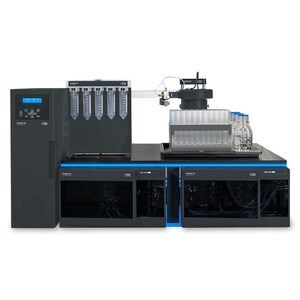
MATTHEWS, N.C., July 27, 2011 /PRNewswire/ -- CEM Corporation, a leading global provider of microwave laboratory instrumentation, continues to see strong success with its microwave peptide synthesis products. In FY2011 year-to-date, the company has seen significant growth versus the prior year in its automated peptide synthesizer instrument sales and is on pace to easily sell a record number of systems. Additionally, CEM's products were well received at the recent American Peptide Symposium, which was held June 25-30, 2011 in San Diego, CA, including its new semi-automated microwave peptide synthesizer, the Discover® SPS Plus.
(Logo: http://photos.prnewswire.com/prnh/20090622/CL35336LOGO-b )
"We are very pleased with our successful results this year," said Michael J. Collins, president and CEO of CEM Corporation. "They continue to demonstrate that CEM is the leader in peptide synthesis. Our technology is now broadly accepted and has been transformational in enhancing peptide synthesis."
CEM has been awarded multiple patents related to the use of microwave energy for peptide synthesis(1). CEM's patented process uses microwave energy to enhance both the deprotection and coupling steps in manual and automated peptide synthesis. This means that other microwave peptide synthesizers (manual or automated) are limited to applying microwave energy only in the deprotection or coupling step in a single vessel.
"An average length peptide contains many deprotection and coupling steps. As incomplete reactions are routinely observed in both steps, it is a significant disadvantage to use microwave energy for only one of the two reactions at each cycle," explained Collins. "Our patented process is faster and results in higher purity peptides, giving CEM a long-term advantage in the field."
Access to the patented process is included with the purchase of any of CEM's manual, semi-automated, or fully automated peptide synthesizers. This technology is not available with other microwave peptide synthesizers.
CEM designed, developed, and introduced the world's first microwave peptide synthesizer to the scientific community in 2003. Since that time, CEM has expanded its portfolio to include manual, semi-automated, fully automated (single channel), and fully automated (12-channel) systems. All of CEM's peptide synthesizers can operate under conventional conditions, microwave conditions, or a combination of both. Both fully automated systems can be equipped with an optional UV monitoring system. Additionally, the manual and semi-automated systems can be upgraded to either of the fully automated versions.
Each one of CEM's peptide synthesizers utilizes in-situ fiber optic temperature monitoring during heating. In-situ temperature monitoring helps avoid temperature overshoots from use of external IR monitoring, which can lead to significant side reactions. In 2007, researchers at CEM showed in a major publication that precise temperature control limits major side reactions such as racemization and aspartimide formation(2). CEM's methods are now routinely used in hundreds of laboratories worldwide.
(1) Including among others US7,563,865; US7,582,728; US7,393,920, EP1491552. Additional International Patents filed and pending.
(2) Palasek S., Cox Z., Collins J., J. Pept. Sci.13,143-148, 2007.
CEM Corporation, a private company based in Matthews, North Carolina, is the leading global company specializing in scientific solutions for critical laboratory applications. The Company has subsidiaries in the United Kingdom, Germany, Italy, France, and Japan, as well as a global network of distributors. CEM designs and manufactures systems for bioscience applications, life sciences, analytical laboratories and processing plants worldwide. The Company's products are used in many industries including pharmaceutical, biotech, chemical and food processing, as well as academic research.
SOURCE CEM Corporation






Share this article